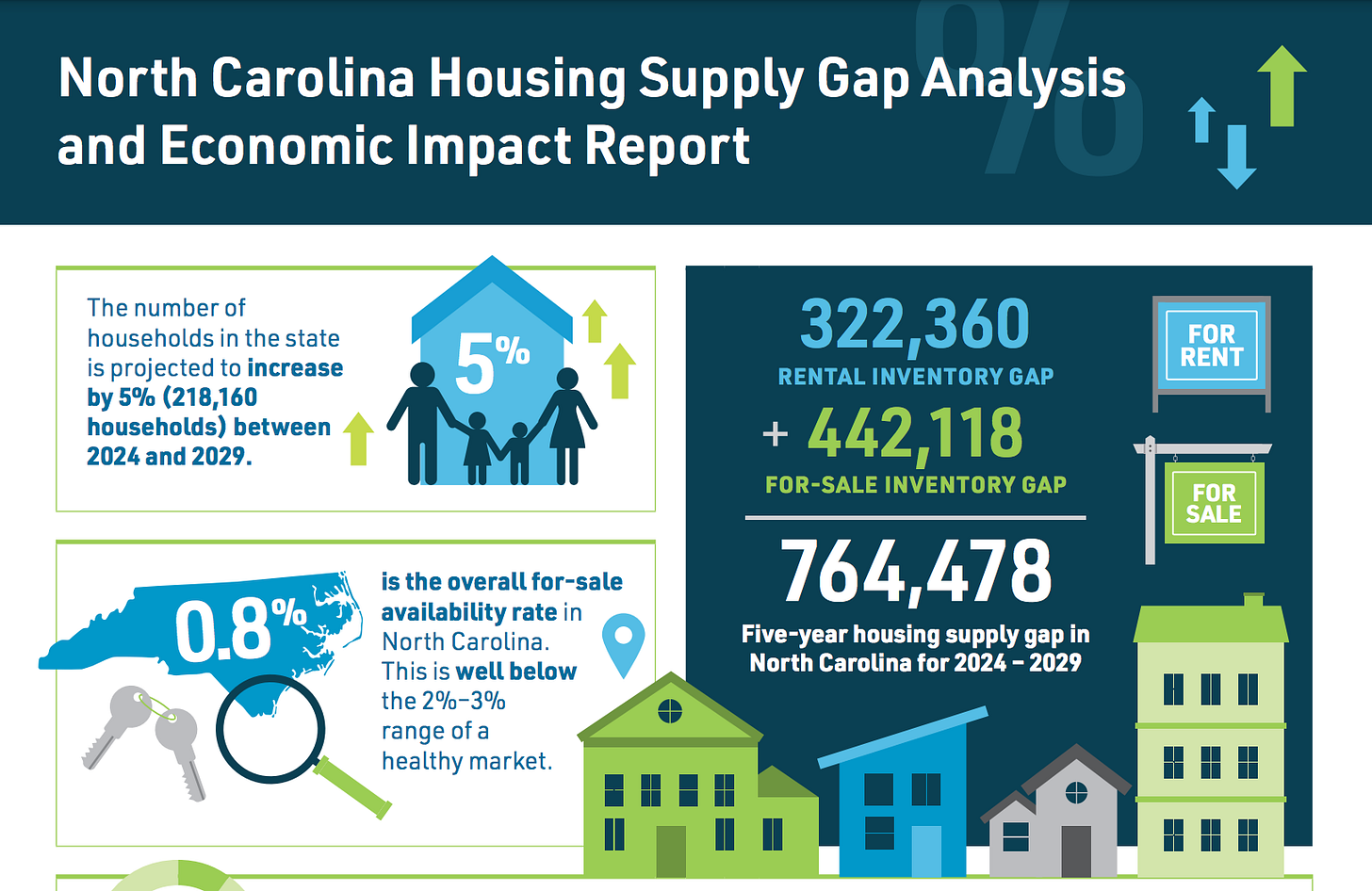Golden Gates and Gold Leaf
How a bestselling book about San Francisco's housing now applies to North Carolina
Golden Gates: Fighting for Housing in America was featured in March as part of the Citybuilder Book Club. Citybuilder Members get access to virtual and in-person events to discuss the application of essential books to local policy and practice. On May 23, in Raleigh, I will lead a conversation about Sarah Susanka’s The Not So Big House. To attend, Subscribe today.
In "Golden Gates: Fighting for Housing in America," Conor Dougherty dissects the multifaceted housing crisis, focusing on the San Francisco Bay Area. Three compelling themes emerge: restrictive zoning laws, grassroots activism, and economic inequality. These narratives offer valuable insights applicable to North Carolina's housing landscape.
Restrictive Zoning Laws
Dougherty emphasizes how local zoning regulations have stifled housing development, exacerbating affordability issues. He observes, "At least at the local level, zoning is democracy, and democracy is zoning." This highlights the profound influence local communities wield over land-use decisions, often leading to restrictive policies that limit housing supply.
In North Carolina, similar zoning challenges persist. Efforts to introduce "missing middle" housing—such as duplexes and townhomes—face resistance due to existing zoning laws favoring single-family homes. For instance, Raleigh's recent approval of "gentle density" measures aims to diversify housing options, but such initiatives often encounter community pushback.
Grassroots Activism
The book showcases the rise of grassroots movements advocating for increased housing development. Activists like Sonja Trauss and groups such as the Bay Area Renters' Federation (BARF) challenge the status quo, pushing for policies that promote housing growth. Dougherty illustrates how these activists confront entrenched interests and navigate complex political landscapes to effect change.
In North Carolina, similar grassroots efforts are underway to address housing affordability. Community organizations advocate for policy reforms to increase housing supply and reduce costs. For example, discussions around eliminating parking minimums statewide aim to facilitate more flexible and affordable housing developments.
Economic Inequality and Housing Affordability
Dougherty examines how economic disparities exacerbate housing challenges, noting that "America is willing to subsidize as much debt as homeowners can gorge themselves on but that poor renters... are a penny-ante side issue unworthy of being prioritized." This critique highlights the imbalance in housing policies that favor homeowners over renters, deepening inequality.
North Carolina's housing market reflects similar issues. The state faces a significant housing supply gap, with a shortage of approximately 764,000 homes. Addressing this deficit could generate substantial economic activity and create nearly 2.2 million jobs. However, without targeted policies to support affordable housing, economic disparities may continue to widen.
Community Resistance to Development
Dougherty highlights the entrenched opposition to new housing developments, often rooted in nostalgia and resistance to change. He notes, "NIMBYism is so entrenched and rooted in nostalgia that you could propose new apartments on an abandoned lot and still have someone protest the building on the grounds that the abandoned lot 'was the first place I got fingerbanged.'" This underscores the emotional and sometimes irrational resistance to development, even in underutilized areas.
In North Carolina, similar sentiments manifest as communities resist changes to neighborhood character. Efforts to increase density or introduce affordable housing often face opposition from residents concerned about property values, traffic, and preserving the existing community aesthetic. Overcoming such resistance requires comprehensive community engagement and education on the benefits of inclusive housing policies.
Disparities in Housing Policy Priorities
Dougherty critiques the prioritization of homeowner subsidies over renter assistance, highlighting a systemic bias in housing policies. He states, "America is willing to subsidize as much debt as homeowners can gorge themselves on but that poor renters... are a penny-ante side issue unworthy of being prioritized." This reflects a broader societal tendency to favor wealthier homeowners over low-income renters in policy decisions.
In North Carolina, this disparity is evident in the allocation of resources and support for affordable housing initiatives. While programs exist to assist low-income renters, they lack the funding and political backing afforded to homeowner subsidies. Addressing this imbalance is crucial to creating a more equitable housing market for all residents. In my view, nothing is more powerful or critical than ensuring the least wealthy have strong property rights and can provide for themselves.
The narratives explored in "Golden Gates" offer valuable insights into the housing challenges confronting North Carolina. By examining restrictive zoning laws, fostering grassroots activism, addressing economic inequalities, overcoming community resistance, and rebalancing policy priorities, the state can work towards a vibrant and robust housing market.
This blog is produced in alignment with the Incremental Development Alliance. Want to learn more about Incremental Development Alliance? Watch the video and become a member today.





